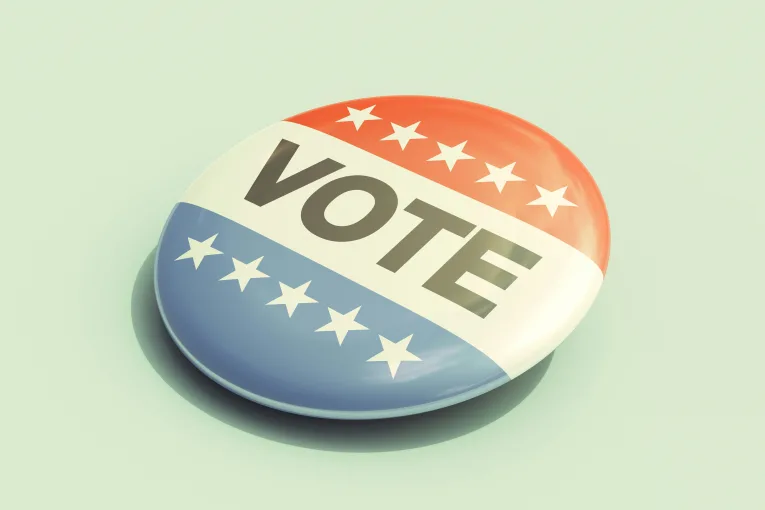
As the United States prepares to choose its next president, I am toiling through my 28th year of incarceration. It is with Election Day fast approaching that I consider the famous 1852 speech by Frederick Douglass, in which he asked, “What, to the American slave, is your 4th of July?”
Speaking to a largely white audience in Rochester, New York, Douglass began by retracing U.S. history to its beginnings—to the inalienable rights of free Americans, rooted in liberty and the pursuit of happiness, and to its founders’ “sublime faith in the great principles of justice and freedom.”
Then, in a sharp turn, Douglass challenged his audience: “What have I, or those I represent, to do with your national independence? Are the great principles of political freedom and of natural justice, embodied in that Declaration of Independence, extended to us?” He asked his famous question about the meaning of the 4th of July to enslaved people, living in a slave nation that was nonetheless proud of its democracy, and responded fiercely on their behalf:
“I answer: a day that reveals to him, more than all days in the year, the gross injustice and cruelty to which he is the constant victim. To him, your celebration is a sham: your boasted liberty, an unholy license; your national greatness, swelling vanity; your sounds of rejoicing are empty and heartless; your denunciation of tyrants, brass fronted impudence; your shouts of liberty and equality, hollow mockery…”
This passage inspired me to think about the meaning of Election Day 2024 to the 1.9 million people incarcerated in the United States today. Nearly all of us are legally or effectively prevented from voting, as are millions more who have already served their time. According to a new report, in the 2024 election, approximately 4 million American citizens will be disenfranchised due to current or previous felony convictions. This amounted to one in 59 Americans and one in 22 Black Americans of voting age.
The latter figure is hardly surprising, since there are now many more Black men under correctional control than were enslaved when Frederick Douglass made his 4th of July speech. In addition, the 13th Amendment, which states, “Neither slavery nor involuntary servitude, except as a punishment for crime…shall exist within the United States,” preserves the last vestiges of slavery within our prisons.
The persistent slave mentality of our nation, expressed in large part through our system of mass incarceration, plagues us like an old wound, which will forever pain our souls, as long as we resist the healing balm of facing the truth.
At my core, I am a patriotic American—a veteran who, at the age of 17, raised his right hand and swore to defend our nation with my life. But now I am 67, and that same nation has seen fit to confine me to a prison cell for more than half of my adult years.
Throughout that time, I’ve had no say in the government that determines my fate. As I remain hidden behind the concrete walls built around me, in a cage about the size of a parking space, I’m barred from influencing even those policies and practices whose outcomes I’ve been uniquely positioned to observe.
While I believe in paying my debt to society, I also believe that my country incarcerates far too many people, for far too long. I witness every day the outcome of policies that favor punishment and retribution over mercy and rehabilitation. I see the change in folks after doing time and, sadly, that change is mostly for the worse. The estimated 600,000 people who leave our prisons and jails every year come home carrying the trauma of neglect and abuse.
Prison is meant to take away our freedom, but too often it deprives us of our dignity and humanity as well. Perhaps no day of the year reminds us of this more acutely than Election Day.
A momentous Supreme Court decision from 1964 states: “No right is more precious in a free country than that of having a voice in the election of those who make the laws under which, as good citizens, we must live. Other rights, even the most basic, are illusory if the right to vote is undermined.”
Yet, here I sit as an incarcerated American, keeping a tenuous grasp on my citizenship, afforded certain inalienable rights but deprived of many others—among them, the simple right to vote. In the past two presidential races, I helped to run a “mock election” at my prison, San Quentin, with the results published in The Guardian. There was no lack of interest in the outcome of the elections—only the sure knowledge that in the real world, our votes didn’t count.
Is it surprising, then, that as all eyes are riveted on the presidential election, I am reminded of Douglass’s words about how “empty and heartless” such occasions can be to those who are excluded from them? Until and unless things change, Election Day, to myself and my incarcerated brethren, will always stand as a “hollow mockery” of the American ideal of democracy.
Juan Moreno Haines is an incarcerated journalist now serving his 28th year at San Quentin prison in California. He is editor-in-chief of Solitary Watch and former senior editor of the San Quentin News, and his work has also appeared in The Guardian, San Francisco Chronile, Los Angeles Times, American Prospect, and CalMatters, among others. A member of the Society of Professional Journalists, he was awarded its Silver Heart Award for being “a voice for the voiceless.”